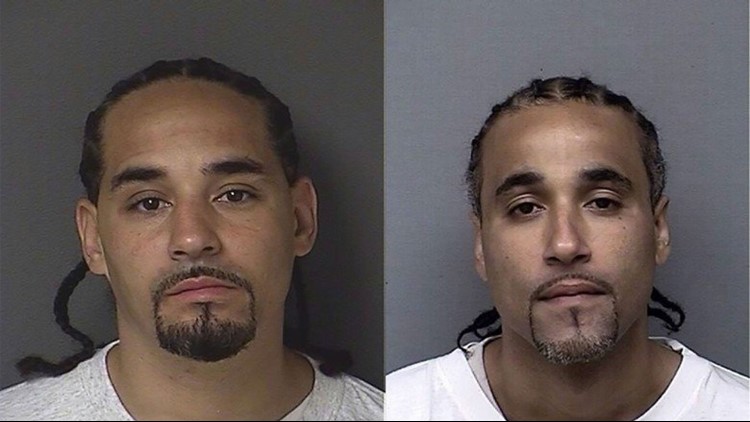What if you landed in prison for 17 years for a crime someone who looked just like you was suspected of committing?
That’s what happened to Richard Jones in 1999. But Jones was released from prison June 8 after a team from the University of Kansas’ Project for Innocence found his doppelganger.
His lawyers say in 1999, a man named Rick was picked up at a home by a trio of crack smokers looking for drugs in Kansas City, Kansas. Rick told the group he could help them get more drugs, but he’d need money first.
So the group drove to a nearby Walmart and Rick tried to steal a woman’s purse. The woman fought back and held onto the purse, but Rick made off with her cellphone. Because the woman fell and scraped her knees, the phone theft was classified as an aggravated robbery.
A ‘suggestive’ lineup
A witness wrote down the license plate number of the car involved in the robbery. Investigators tracked down the driver of the car, who led them to the house where Rick lived.
Then the driver went to the precinct, where he looked through booking photos of people with the name Richard and Rick that matched the description the victim and a security guard had given: “a light-skinned Hispanic or African-American man with long hair pulled back.”
“The driver was on photo 202 when he saw Mr. Jones. A lineup was made, a very suggestive one, and shown to the security guard and another passenger in the car,” said Alice Craig, the lead attorney who worked to free Jones. “He was the only light-skinned man in the lineup. The victim later ID’ed Richard (Jones) as the one who committed the crime, during a preliminary hearing and trial.”
It didn’t matter that Jones had a solid alibi, Craig said. He was at his girlfriend’s birthday party, where several guests testified they saw him, and he had spent the next day watching movies with the girlfriend and cleaning up after the party. Jones did live in Kansas City, but on the Missouri side.
The discrepancies didn’t matter to the jury and Jones was sentenced to 19 years on aggravated robbery because he had prior convictions.
Jones appealed and lost. Then he learned about the Midwest Innocence Project, which partners with the University of Kansas’ Project for Innocence. Craig’s team investigates and litigates cases for the Project for Innocence.
Tracking down the doppelganger
Craig said they launched their investigation into the case by reading police reports and trial transcripts.
“We were concerned because it was based solely on eyewitness identification,” Craig said. “At trial, the two guys that were in the vehicle both said that Richard looked like the guy, but essentially, that isn’t the guy.”
That testimony was crucial to making their case, but Craig’s team couldn’t overturn the conviction without a suspect.
“The first thing we did was, my interns went out to interview Richard and that’s how we got Ricky’s name,” Craig said. “Richard told them, ‘I’m not sure if this means anything, but guys in here (jail) say ‘hey, there’s a guy named Ricky who lives in Kansas City, Kansas, who looks just like you.”
Craig’s team looked into the lead and saw the striking similarities between the two men’s mugshots. They found that Ricky Amos was associated with the address linked to the crime.
“Next we took Ricky’s mugshots to the two guys in the car, the security guard, and the victim and asked, ‘If you were presented with these two, would you be able to choose who did the crime?’ They said no and presented us with affidavits that we took to a judge,” Craig said.
“The judge reversed the jury trial and the state dismissed” the case, she said.
Getting reacquainted with family
Jones is 41 now and plans to enjoy his freedom and spend time with his family.
“He’s doing great. He has a lot of family support,” Craig said.
That support includes his two daughters, who grew up without him.
“One daughter is only 17 now. She had never seen him before, and he has two grandchildren from an older daughter,” Craig said.
Does Jones wish Amos any ill will?
Craig said, “I don’t think so, because it’s not Ricky’s fault that this happened, but ultimately he was the one we believe who was responsible for the crime. Ricky has never admitted to the crime and I think he [Jones] … was somewhat disappointed that he didn’t admit to [it].”
The statute of limitations on the crime has passed, so if there was a case against Amos, he cannot be prosecuted.
Amos is in prison, according to the Kansas Department of Corrections website. His previous convictions include aggravated sexual battery, drug possession and robbery.
“The one thing Richard always says is, he was pretty bitter for a while. He could never figure out why people would have picked him as the one who committed the crime, but when we showed him Ricky’s photo he understood. From the outside looking in, he gets that they look so much alike.”
Jones can’t get the last 17 years of his life back, and though most states have compensation laws for people who have been wrongfully incarcerated, Kansas does not.
Is a lawsuit in the future?
“He is certainly considering it,” Craig said.



